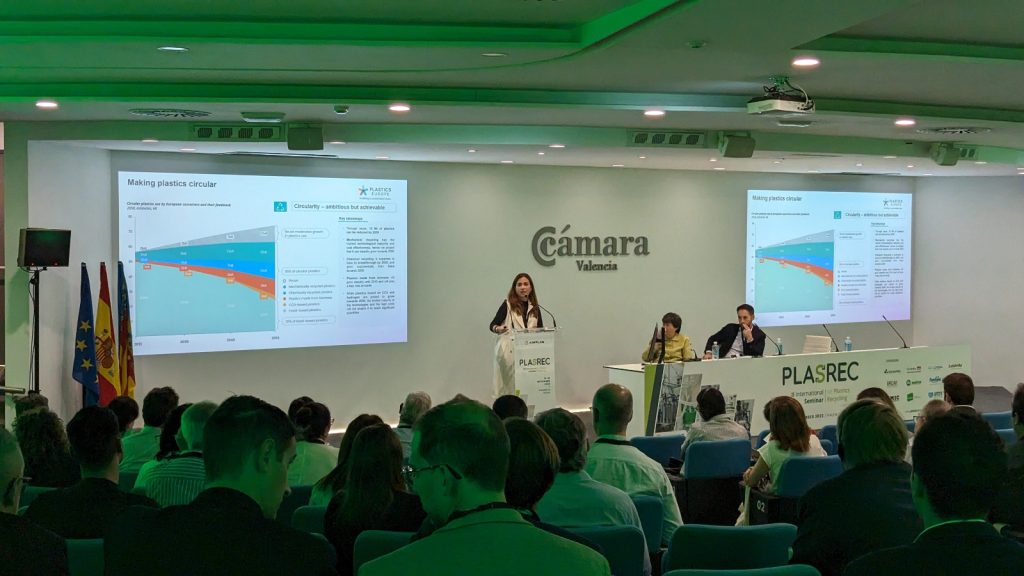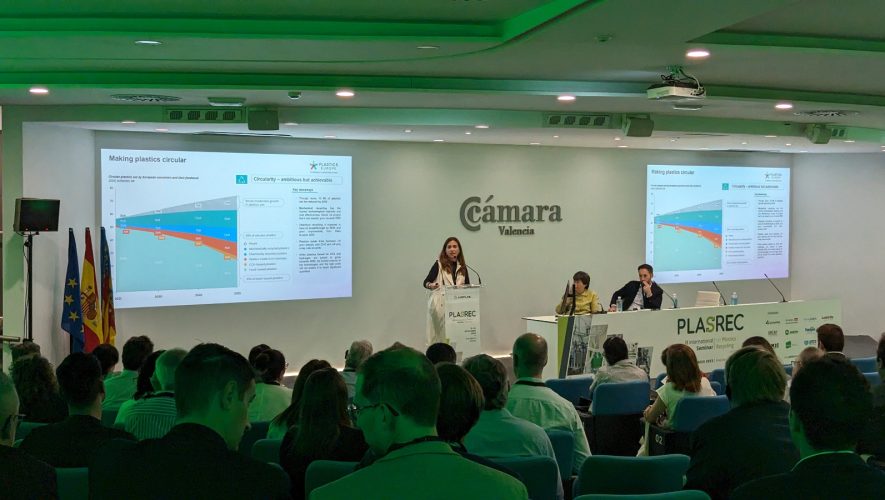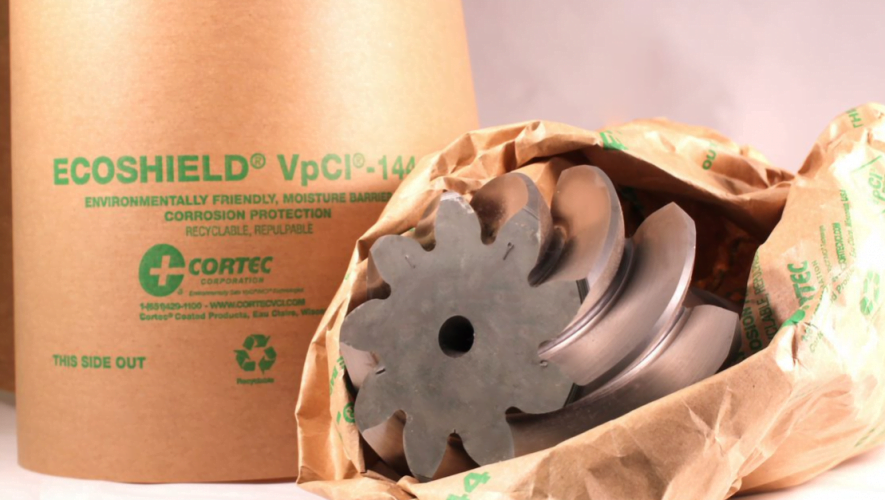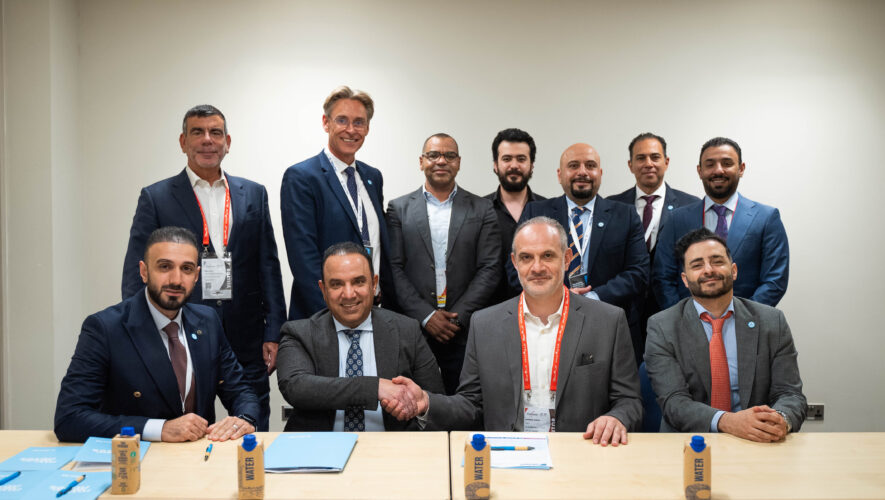
AIMPLAS, the Plastics Technology Centre, concluded its second edition of PLASREC, the International Seminar on Plastics Recycling. A total of 160 professionals from the plastics recycling sector participated in the event. During the two-day conference, specialists discussed industry challenges and opportunities presented by sector organizations, European representatives, and companies, who analyzed the sector’s current context and presented their innovations designed to achieve the circularity of materials and plastic products.
In the first session, Laure Baillargeon, from the Circular Plastics Alliance, an initiative of the European Commission, explained that five million tonnes of recycled plastics are currently being produced, which is half the target set for 2025 and means that there is still much work to be done and many systemic changes to be made in the value chain. Carlos Prieto, from Plastic Energy, then commented on the complementary nature of mechanical and chemical recycling. In his presentation, he focused on the use of pyrolysis for waste such as PE, PP, and PS. Oscar Hernandez, from Anarpla, highlighted the increase in the capacity of mechanical recycling in Europe, the lack of demand in 2023, the drop in prices, and the need to continue working on sustainable demand, new applications, ecodesign, and the appropriate certifications. Finally, Irene Mora, from Plastics Europe, presented a roadmap for the plastics industry towards the circular economy and decarbonization. She also stressed the importance of recycled materials, materials created from renewable sources such as biomass, and CO2 capture materials in achieving a circular economy and zero emissions in the sector. In the second block, Yolanda Fuster, from Doeet MES, outlined the key points for ensuring traceability throughout the entire value chain of recycling using the MES system,
which will also make it easier to obtain certifications. Guillem Perez, from Aritex, explained how the Internet of Things can improve the implementation and efficiency measuring of processing plants. Fernando Molinuevo, from Mesbook, then highlighted the need to approach the digitalization of businesses in a global manner, including the kind of equipment installed, what is measured and the data to be obtained from proper digitalization. Lastly, Marien de Lint, from Filigrade, presented new methods, such as watermarks, to make it easier to identify complex waste and waste that is more difficult to
identify using current methods, because these new methods can provide information on the polymer type, source of the waste and its composition.
In the third block, Adrian Morales, from AIMPLAS, spoke about trends and new mechanical recycling technologies for processing new waste streams and stressed the importance of developing and improving current technologies to promote recycling. Andreas Habrich, from Kubota Brabender, then presented an innovative system that makes polymer dosing easier for existing transformation equipment. Carlos Gómez, from Break Machinery, presented new filtering systems that maintain constant pressure in the
spindle and during self-cleaning. He also presented a quick system for changing filters that considerably reduces the time spent by current systems. Finally, Isabel Arroyo, from Dow, demonstrated the advances in film plastic circularity and the development of compatibilizers for PE/EVOH materials with the commitment of having all their products designed to be recycled by 2024. The day ended with two workshops on the projects SOL-REC2 and Red Osiris, in which their latest technological advances were presented.
The second day of PLASREC started with a talk by Mireia Fernandez, from AIMPLAS. She discussed the opportunities that come from chemical recycling of complex streams of elastomers, thermosets, textiles and multilayers, as well as innovations in energy efficiency and microwave-assisted processes (solvolysis and pyrolysis), solvent-free processes (mechanochemistry to put chemical recycling on a par with mechanical recycling), partial depolymerization and enzymatic recycling. Sixto Arnaiz, from GAIKER,
then presented the PLASTIC2 MONOMER Project, which focuses on alternatives to chemical recycling of complex PET waste. His presentation was followed by Daniel Campo, from BASF, who discussed his research on different chemical recycling technologies with the aim of recovering polyols from used polyurethane mattresses, as well as dissolution processes for eliminating additives and color from waste from the textile industry, gasification processes for mixed waste to obtain methanol, and pyrolysis
processes such as ChemCycling. Campo also highlighted the importance of mass balance. Jorge Avila, from Intecsa, announced the future implementation of three microwave-assisted solvolysis plants in Spain for treating PET and other polyesters.
Virginie Bussières, from Pyrowave, spoke about the processes of eliminating contaminants such as inks, additives and other fillers using electrification processes with chemical and physical recycling so they can be marketed as recycled materials for different applications. In the following block, Jose Antonio Alarcon, from Petcore, discussed the topic of PET recycling and identified the main barriers to PET circularity, the most important ones being collection and uses for the recycled material.
Alarcón highlighted the complementarity of mechanical and chemical recycling processes,
the problems of using recycled products for food contact packaging, and the presence of
NIAS. Salome Beneyto and Laura Santos, from Ateval, discussed problems related to
waste in the textile industry, such as multi-fibers, raw materials, the use of chemicals, the
generation of wastewater, the mixture of materials, finishes after manufacturing, and use
itself. It was also mentioned that life cycle analysis has identified manufacturing and use
as the stages with the greatest impact. Spain’s potential in mechanical recycling was
highlighted, as well as the importance of continuing to work on separation, traceability, and
other recycling processes. Pilar Martin-Luengo and Julio Marinas, from the Spanish
Consortium of Rubber, spoke about the need to continue working, given the legislative
tsunami and to continue searching for solutions for dealing with rubber waste that is less
prevalent than tyre waste. The last speaker was Alejandro Navazas, from Euric, who
addressed the challenges of the tyre sector, such as applicable legislation and the
prohibition to be enforced in eight years’ time of using shredded rubber in football and
sports fields and which could lead to waste being exported outside the EU.
The seminar concluded with a block in which the companies and organizations Leistritz,
Carburos Metálicos, UBE, Sabic, and Universität Leipzig presented their most advanced
techniques for improving recycling processes.
PLASREC was sponsored by Gravipes, Kubota Brabender, Raorsa, Leistritz, BreakMachinery, Anarpla, Fontijne Presses, the ReMade@ARI Project, FIMIC, Eversia, Carburos Metálicos and Promak.



